TLDR;
Dogs lick their paws at night due to a mix of normal grooming, self-soothing behaviors, or underlying issues such as allergies, anxiety, pain, or skin infections. While occasional licking is normal, excessive nighttime licking can signal something more serious and should be evaluated by a veterinarian.
A Common but Overlooked Behavior
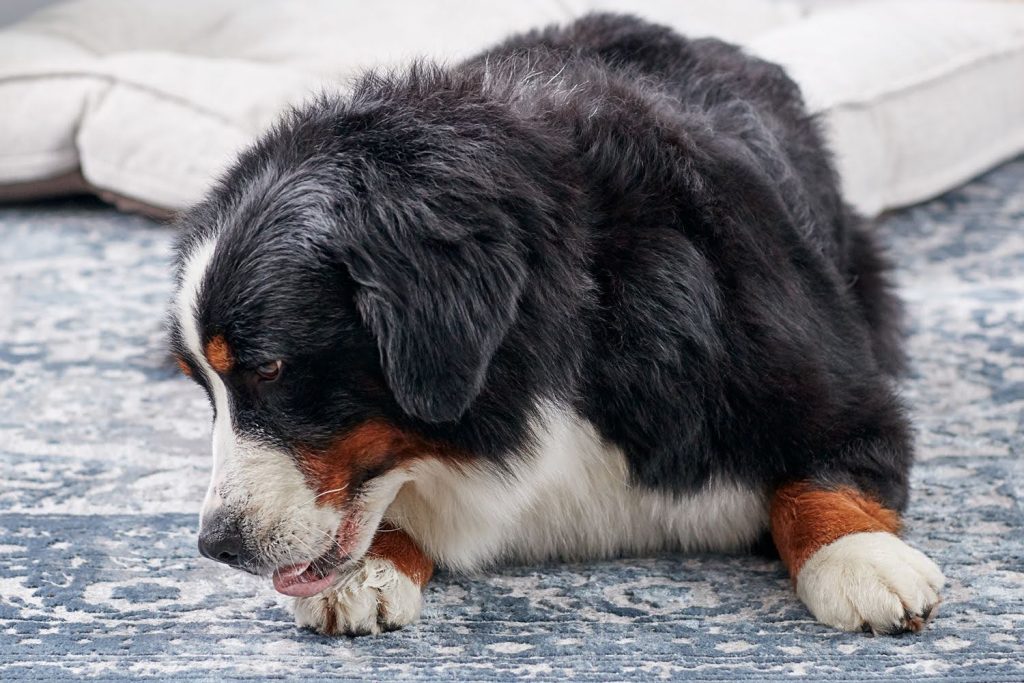
If you’ve ever sat up in bed wondering, “Why does my dog keep licking his paws at night?” — you’re not alone. This seemingly harmless behavior can be anything from a natural grooming routine to a red flag for allergies, pain, or stress. Sometimes, dogs may also bite at their tails for similar reasons, signaling discomfort or anxiety that shouldn’t be ignored.
At Careers Collectiv, we believe informed pet ownership starts with understanding behaviors like these from all angles — physical, emotional, and environmental. This blog dives deep into the science, psychology, and medical possibilities behind nighttime paw licking, providing guidance grounded in veterinary insights and canine behavior research.
Is It Normal for Dogs to Lick Their Paws Before Bed?
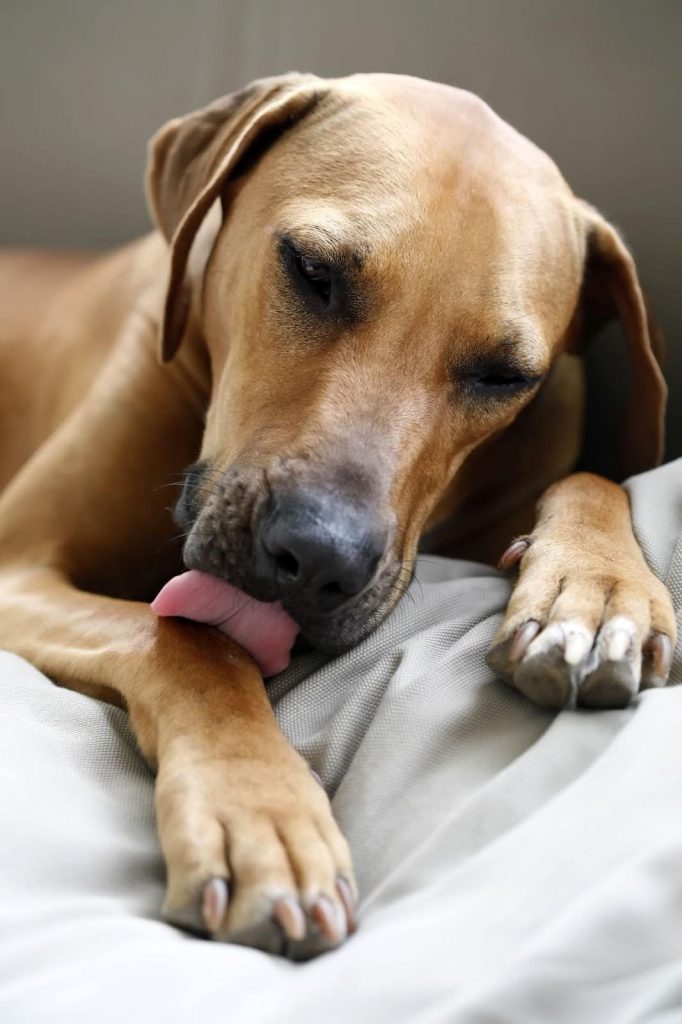
Yes, it can be — but only to a point.
Many dogs lick their paws before bed as part of a natural grooming habit. Like brushing your teeth or fluffing your pillow, this routine helps them settle in for the night. However, when licking becomes obsessive or focused on a specific paw, it could mean discomfort, irritation, or stress.
Normal Self-Grooming
- Cleaning dirt after walks or play
- Removing debris or allergens from paws
- Calming themselves before sleep
Obsessive Licking (A Red Flag)
- Focused on one paw or area
- Continues for long durations
- Causes redness, hair loss, or open wounds
Understanding the line between routine and problematic behavior is key to spotting when your dog needs help.
Dog Licking Paws at Night Meaning: The Underlying Causes
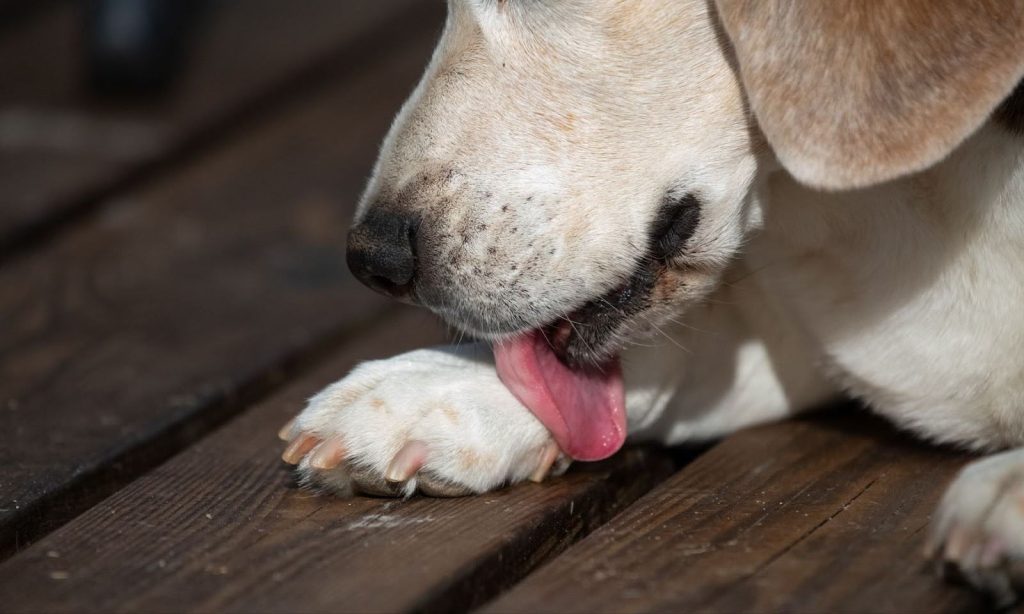
Why Do Dogs Lick Their Paws More at Night?
1. Allergies (Environmental, Food, or Seasonal)
Allergies are one of the most common culprits behind excessive nighttime paw licking. When allergens irritate a dog’s skin, the discomfort often intensifies at night when distractions are gone.
Types of Allergies to Watch For:
- Environmental: Dust mites, mold, grass, pollen
- Food-related: Proteins like beef, chicken, dairy, wheat
- Seasonal: Pollen peaks in spring or fall
Signs Your Dog Might Have Allergies:
- Itchy paws, ears, or skin
- Frequent scratching or licking
- Ear infections
- Hot spots
Dogs with allergies may also show signs like sneezing, watery eyes, or digestive upset, which help differentiate them from behavioral causes.
2. Anxiety and Stress Triggers
Licking is a known self-soothing behavior in dogs, similar to humans biting their nails. Anxiety can surge before bedtime, especially in dogs with:
- Separation anxiety
- Fear of loud noises (fireworks, thunderstorms)
- Changes in the home environment (new baby, move, etc.)
Common Nighttime Stress Triggers:
- Owner going to bed = separation
- Less stimulation = awareness of stress
- Nighttime sounds like creaking floors or wind
How to Spot Stress-Related Licking:
- Pacing or restlessness
- Panting without heat
- Avoidance behaviors
- Tail tucked or ears back
A dog that starts licking shortly after the house quiets down might be struggling with bedtime anxiety.
3. Pain or Physical Discomfort
Dogs may lick a paw persistently if they’re experiencing pain, injury, or irritation in that specific area. This could be due to:
- Injury: Cuts, scrapes, or bruises
- Joint pain: Especially in older dogs with arthritis
- Foreign object: Burr, thorn, or splinter stuck in the paw
- Burns: From hot pavement during the day
What to Check:
- Is your dog limping?
- Does the paw look swollen or red?
- Is the area sensitive to touch?
- Do they flinch when you inspect it?
Dogs hide pain well. Licking is often one of the first behavioral clues that something’s wrong.
4. Skin Conditions and Infections
Skin issues like dermatitis, yeast infections, or bacterial infections are all common causes of itchy, irritated paws. At night, these symptoms can become more noticeable.
Conditions That Cause Nighttime Licking:
- Dermatitis (allergic or contact): Red, inflamed skin
- Yeast infections: Foul odor, greasy skin
- Bacterial infections: Oozing, swelling
- Dry skin: Especially during winter or in dry climates
Left untreated, these conditions can escalate. Constant licking can even cause secondary infections like lick granulomas.
5. Parasites and External Irritants
Fleas, ticks, mites, and even certain grasses or chemical residues (like lawn treatments) can trigger irritation and itching on the paws.
Common Parasites That Affect Paws:
- Fleas: Often lead to intense scratching and licking
- Mites: Cause mange, which is intensely itchy
- Ticks: Attach between the toes
If your dog is licking multiple paws and shows signs of skin irritation, rule out parasites immediately. Sometimes, it could even be due to an internal worm infestation—particularly hookworms—so deworming your dog may also be necessary.
6. Boredom or Compulsive Disorders
For some dogs, especially high-energy breeds, licking becomes a habit born from lack of stimulation.
Signs Your Dog May Be Bored:
- Licks at consistent times (like every night before bed)
- Doesn’t get much physical or mental exercise
- Left alone for long periods
Over time, this behavior can become compulsive — turning into a behavioral issue known as canine obsessive-compulsive disorder (OCD).
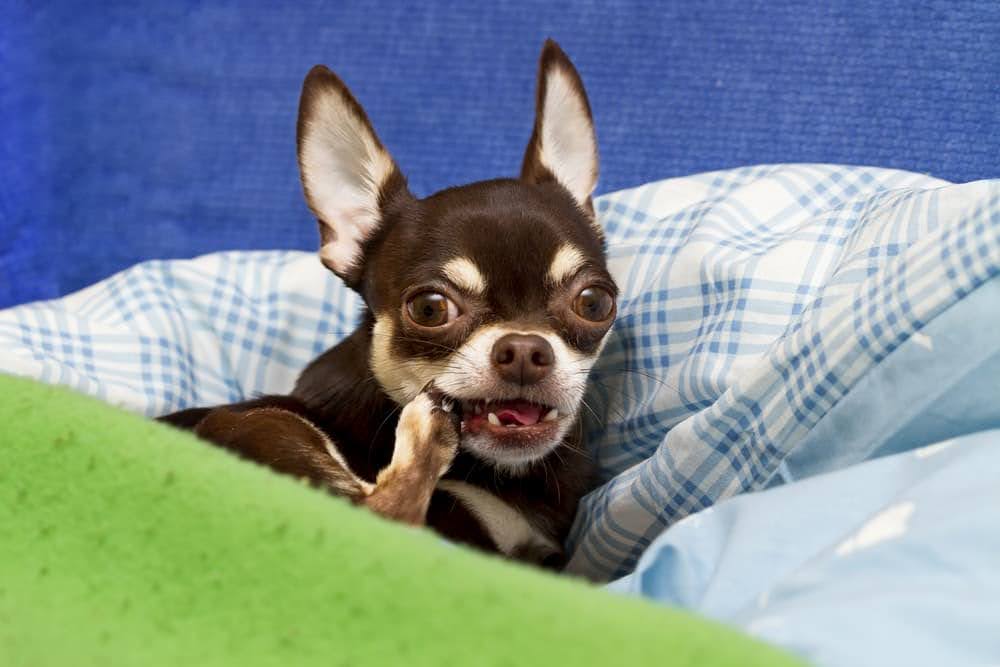
At night, dogs are less distracted, which increases their focus on physical sensations. If they’re slightly itchy or anxious, they’re more likely to notice and respond through licking.
Contributing Nighttime Factors:
- No distractions = heightened body awareness
- Owner’s absence or less interaction
- Bedtime triggers (lights off, silence)
- Reduced environmental noise = more awareness of discomfort
How to Tell If It’s Serious
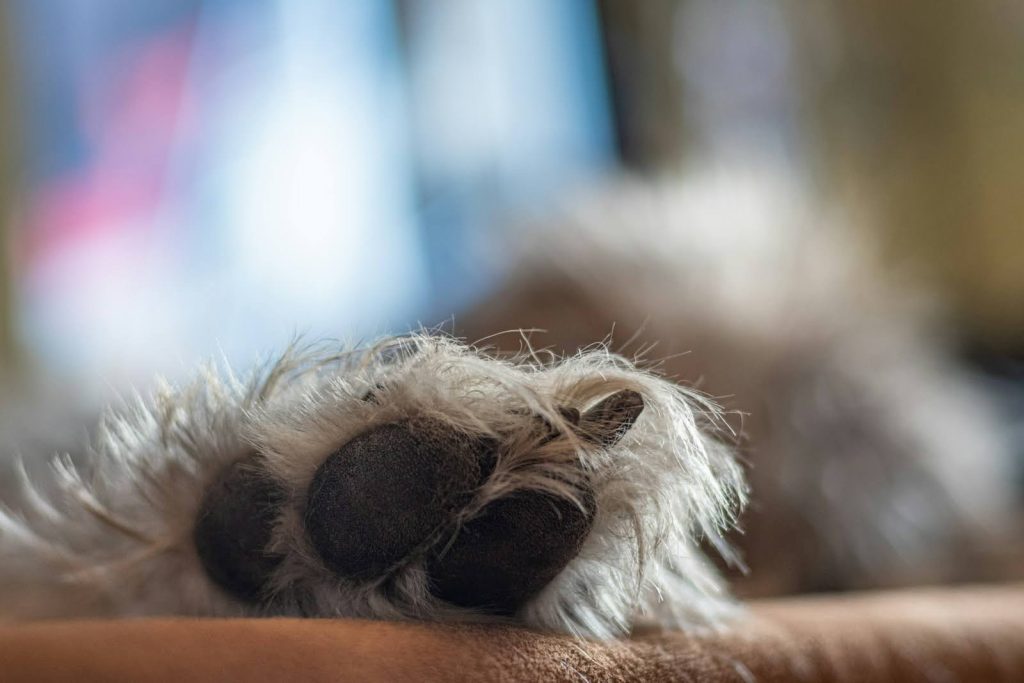
Here’s a quick checklist to help you decide whether it’s time to consult your vet:

How to Stop Your Dog From Licking Their Paws at Night
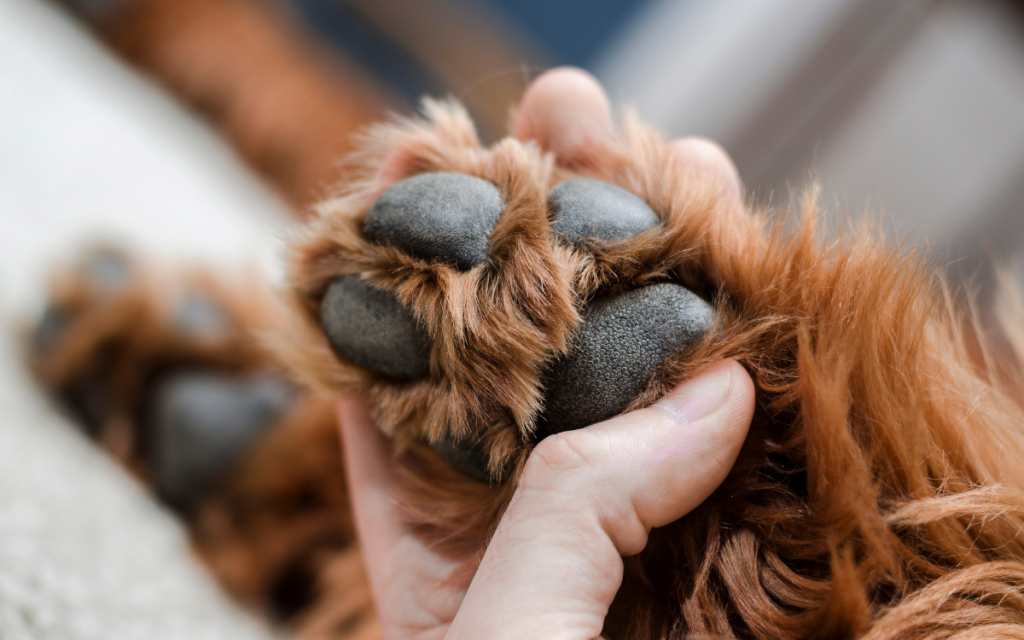
1. Home Remedies
- Coconut oil or paw balm: Soothes dry or cracked pads
- Oatmeal paw soaks: Relieves mild itching
- E-collars or booties: Prevents further irritation
- Wiping paws after walks: Reduces allergens and irritants
2. Medical Treatments
- Antihistamines: For allergies (consult your vet first)
- Antibiotics or antifungals: For infections
- Steroids: For more severe allergic reactions
- Prescription diets: For suspected food allergies
3. Behavioral Solutions
- Increase exercise: Tire them out before bedtime
- Mental stimulation: Puzzle toys, training, sniff walks
- Routine: Keep a consistent bedtime and environment
- Anti-anxiety tools: CBD oil, calming diffusers, anxiety wraps
Prevention Tips for Paw Licking
- Inspect paws daily, especially after walks
- Keep nails trimmed and pads moisturized
- Manage seasonal allergies with vet guidance
- Clean paws with pet-safe wipes
- Enrich your dog’s routine with exercise and play
- Schedule regular vet checkups
Prevention is not just about stopping licking — it’s about improving your dog’s overall health and well-being.
FAQs
Is it normal for dogs to lick their paws before sleeping?
Yes, mild and occasional licking is normal, especially as part of grooming.
Can allergies make my dog lick its paws more at night?
Absolutely. Allergies are a leading cause of itchy paws, especially when your dog settles down for the day.
Should I stop my dog from licking its paws?
If it’s excessive or causing damage, yes. Otherwise, mild licking may be normal.
What home remedies stop paw licking?
Try coconut oil, oatmeal soaks, paw balm, or keeping paws clean after outdoor activity.
When should I see a vet for my dog’s paw licking?
If there’s redness, swelling, sores, or the licking becomes obsessive — don’t wait.
Conclusion
While a little paw licking at night may seem harmless, it can point to deeper issues ranging from allergies to stress or pain. Understanding the reason behind your dog’s behavior is the first step to providing them with relief.
By staying proactive, observing patterns, and seeking help when needed, you can ensure your furry companion sleeps soundly — and so do you.